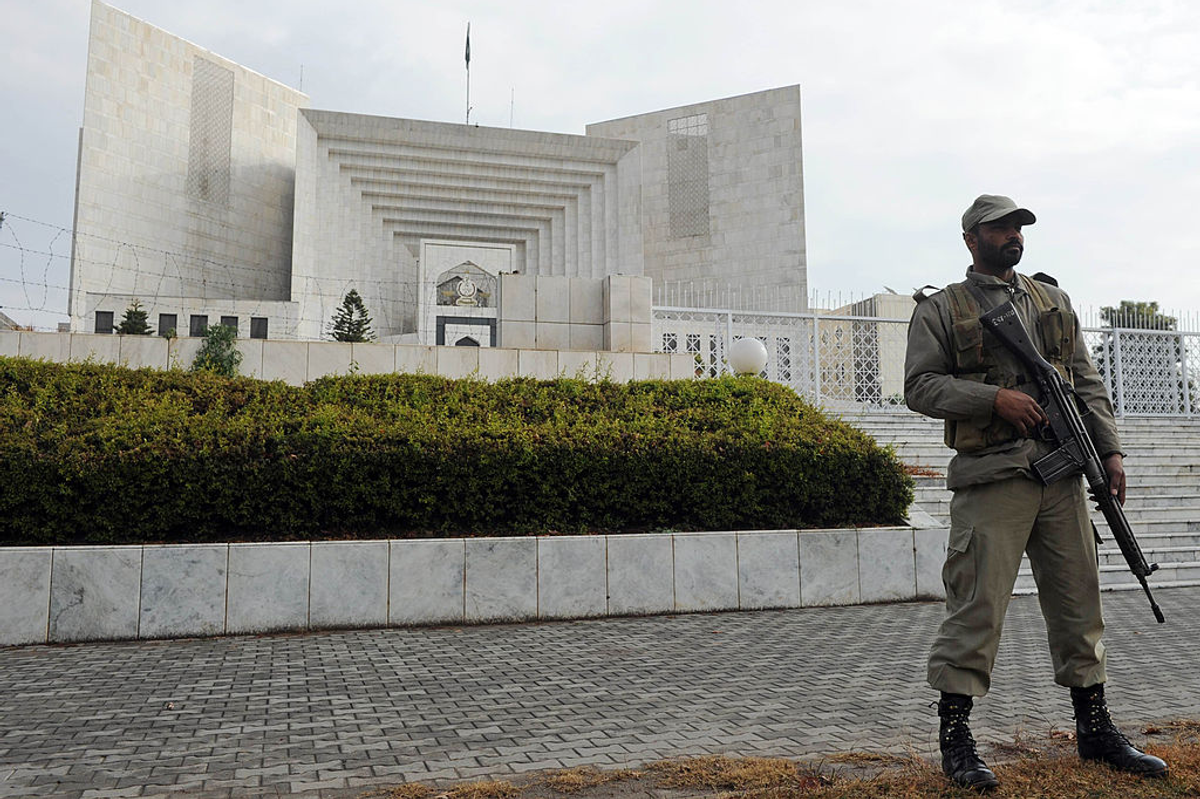Court in Pakistan declares extrajudicial killing ‘brutal abuse of power’
Verdict comes in case of 2020 killing of student in Balochistan; top court upholds paramilitary soldier's conviction, commutes death sentence to life imprisonment
Ali Hamza
Correspondent
Ali; a journalist with 3 years of experience, working in Newspaper. Worked in Field, covered Big Legal Constitutional and Political Events in Pakistan since 2022. Graduate of DePaul University, Chicago.

A security officer stands guard outside Pakistan’s Supreme Court in this file photo.
Picture via X
A Supreme Court judge in Pakistan has condemned the custodial killing of a university student in Balochistan as “gruesome, brutal and shocking,” after the country’s top court, in a split verdict, commuted the convicted paramilitary soldier’s death sentence to life imprisonment.
Justice Athar Minallah, in a strong dissent, said the murder of 28-year-old Mohammad Hayat by a member of the Frontier Corps “outraged public conscience” and met the definition of fasad-fil-arz - a crime causing disorder and corruption on earth - under Section 299 of the Pakistan Penal Code.
He described the act as the killing of an “unarmed, helpless and innocent” young man in front of his parents by a uniformed state officer entrusted to protect citizens.
The three-judge bench upheld the conviction of the soldier, Shadiullah, for Hayat’s 2020 killing but, by a two-to-one majority, reduced his sentence from death to life imprisonment. Justice Irfan Saadat Khan and Justice Malik Shehzad Ahmed Khan formed the majority, while Justice Minallah dissented, arguing the “ultimate punishment” was warranted for such a “cowardly act.”
He noted that the rifle and bullets used were state-issued for official duty, not to “turn the gun barrel on innocent citizens,” and warned that leniency in such cases could encourage vigilantism within security forces and normalize extrajudicial killings.
What's the case?
The case stems from the August 13, 2020 incident in Turbat district, where Hayat was gathering breakfast for his parents in a date plantation when two roadside bombs exploded near Frontier Corps vehicles.
According to court records, two uniformed personnel entered the plantation, detained the unarmed Hayat, dragged him by his hair to a nearby spot where other armed men were present, and one of them - later identified as Shadiullah - fired eight shots into his back as he lay face down. The killing took place in broad daylight, in front of the victim’s parents, who pleaded for his life.
Evidence presented during trial - later reviewed by the Supreme Court - included a judicial confession under Section 164 of the Code of Criminal Procedure, eight spent cartridges matching the accused’s service rifle, and eyewitness identification confirmed through a magistrate-supervised parade.
Although Shadiullah later retracted his confession, denying guilt, the trial court in January 2021 convicted him under Section 302(b) of the Pakistan Penal Code and sentenced him to death — a verdict upheld by the Balochistan High Court in April 2023.
Justice Minallah stressed that the killing was a deliberate abuse of power, not an act of sudden provocation. He rejected the defense claim that the accused acted in anger over injuries to fellow soldiers caused by earlier explosions, saying such reasoning risked undermining the rule of law.
He further wrote that extrajudicial custodial killings, enforced disappearances, and excessive use of force are among the most intolerable violations of constitutional rights. The state’s duty, he added, was to ensure exemplary punishment for those who misuse authority.
“An unarmed man in custody, shot eight times in front of his parents by an officer showing no remorse,” he observed, “meets the threshold for the most severe penalty prescribed by law.”
The Supreme Court’s short order nevertheless commuted the death penalty to life imprisonment by majority decision, with Justice Minallah recording his dissent.
The case record confirms that forensic evidence, ballistic tests, and witness testimony all supported the prosecution’s account of Hayat’s death.










Comments
See what people are discussing